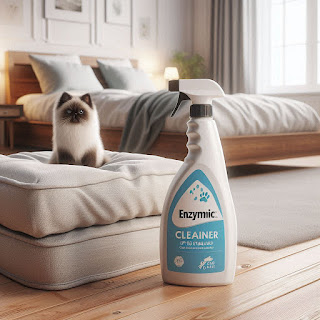Why does my cat urinate on my bed? How to comprehend and solve the problem.
As a cat owner, probably one of the most frustrating and puzzling situations you would have faced is when your cat peed on your bed. This may really drive you to scratch your head, especially since this has been the cat that was quite good with the litter box all along. You perhaps wondered, "Why is my cat peeing on my bed?" Understanding the whys of this behavior is important, not just for the sake of your sanity, but also for your cat's well-being.
Why Do Cats Pee Outside the Litter Box?
Before we delve into the specific reasons your cat may be peeing on your bed, it is vital to know some of the many reasons cats pee outside the litter box. Cats, for the most part, can be very clean animals, and when they start peeing in places they shouldn't, it usually is a sign that something is amiss. Some common ones include:
Medical Issues:
The medical problems include painful urination caused by infections of the urinary tract, bladder stones, or other disorders.
Stress and Anxiety:
Cats may get stressed due to any change in the family, such as bringing a new pet, having a new baby, or even moving to a new residence.
Litter Box Problems:
Cats are picky creatures, and sometimes they may become quite particular about their litter boxes. If the box is dirty, in a noisy location, or made from a certain type of litter that is unappealing to the cat, they try to avoid its use.
Cat Urination on Bed Understanding the Psychology
So, why would your cat find your bed to be the new bathroom? Though it is easy to regard this behavior as vengeful on your cat's part, it usually suggests that your cat is trying to tell you something important.
Seeking Comfort and Security
Dogs are creatures of habit and comfort. Your bed probably has a very strong comforting odor from you. If your cat is anxious or insecure, the peeing on your bed could be marking a safe, comforting location. This can be more common for multi-cat homes but also, especially if there have been significant changes in your routine.
Medical Reasons
If your cat has suddenly started peeing in your bed, then of course, you want to first rule out medical issues. Medical conditions such as UTIs, kidney disease, or diabetes might cause a cat to urinate more frequently and outside of the litter box onto soft, absorbent surfaces, for example, your bed. In this regard, it is important to visit your vet to determine whether some health problems could be the underlying cause.
Litter Box Aversion
Sometimes, the problem is with the litter box itself. There can be a variety of reasons for cats to hate their litter box. Chances are it isn't clean enough, or maybe the litter type has changed. Or perhaps the box simply sits in a spot that your cat finds uncomfortable or confronting. Your cat may wish to avoid the litter box if it links the litter box with some negative experience.
Territorial Marking
The cat is a very territorial animal, and aside from all the ways of marking their territory, urination certainly ranks high. If, for instance, there has been any recent addition in your house-from a new pet to even a new piece of furniture-your cat may feel compelled to reassert dominance through marking its territory. Your bed falls into the category of a central part of your home, hence becoming a prime target.
How to Stop Your Cat from Peeing on Your Bed
Now that we have discussed some probable reasons for this behavior, let us go further to see how one can stop their cat from peeing on their bed. Here are some actionable steps you can take:
Go to the Vet
After ruling out all the medical issues, the first thing you need to do is take your vet to diagnose and treat such conditions that are causing these behaviors in your cat, such as UTIs or kidney diseases.
Clean the Affected Area Properly
It's in a cat's nature to return to places they've urinated on before. Clean the residual smell with a premium enzymatic cleaner designed for cat urine. Don't use ammonia-based cleaners because that will make it even more likely for your cat to pee in that same spot.
Improve the Litter Box Situation
Keep the litter box clean and in a quiet, easy-to-reach location. Multi-cat homes should have at least one litter box per cat, plus one additional if at all possible. You will need to try different types of litter to determine your cat's preference for texture.
Minimize Stress and Anxiety
If your cat is peeing on your bed due to stress, you may want to get rid of the source of the said stress and give your cat plenty of attention, play with it, and provide her several places where she can retreat whenever she feels stressed. You might want to use pheromone diffusers like Feliway to help your cat feel relaxed.
Restrict Access to the Bed
Temporarily limit your cat to your bedroom while you get the issue sorted out. Simply shut the door or install a pet gate, excluding your cat when you are unable to be in the room with him.
Seek Professional Advice
Refer yourself to a certified cat behaviorist if the problem will not go away. They will have personal advice and techniques to help your cat shape up.
Closing Words
It is infuriating to find cat pee on your bed, but it calls for patience and the right approach. Keep in mind that your cat isn't acting out of spite; they're trying to communicate with you. That's the key to being proactive: helping your cat feel safe and secure, while keeping your bed dry.







